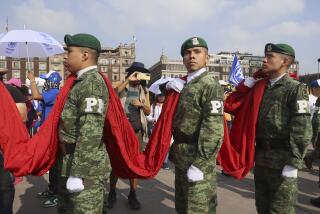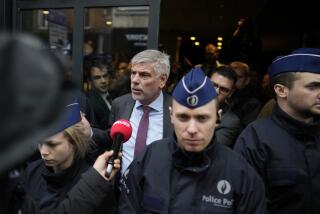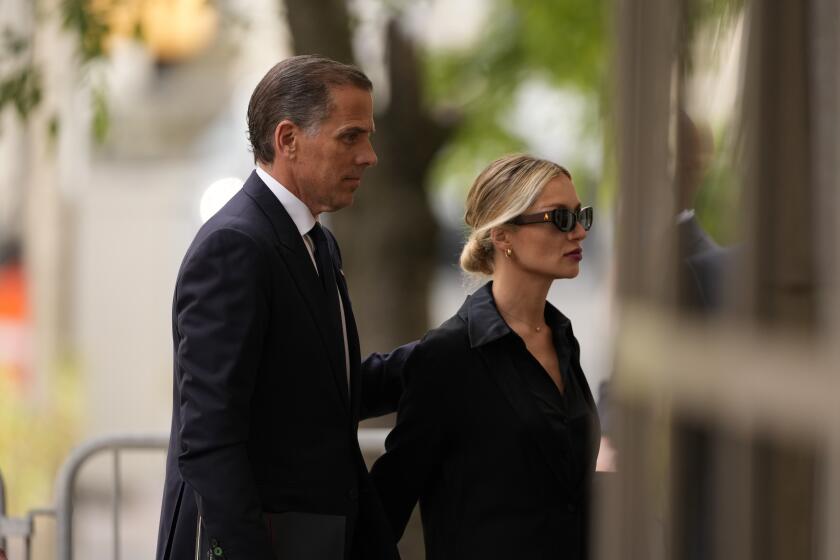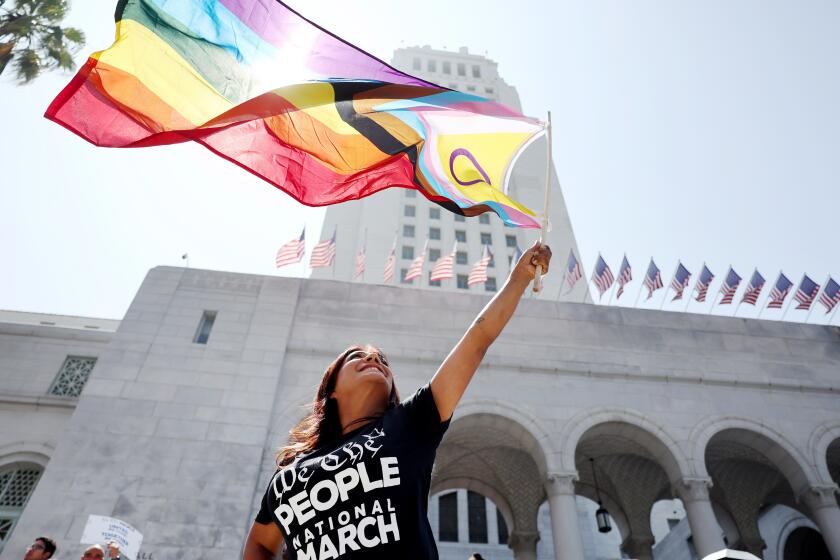China Launches Purge of Party : Associates of Ousted Communist Chief Zhao Expected to Be Targets
One day after General Secretary Jiang Zemin replaced Zhao Ziyang as Communist Party chief, the party’s internal disciplinary group announced Sunday that it is launching a purge.
The party’s 69-member Central Discipline Inspection Commission, in a communique released by the official New China News Agency, expressed unanimous support for a report accusing Zhao of “mistakes in the anti-party, anti-socialist turmoils.” The communique indicated that some of those associated with Zhao will be punished.
Party members “who deviated from the correct political stand and violated the party’s discipline during the turmoils and counterrevolutionary rebellion should be strictly punished . . . including expelling them from the party,” the communique said.
Split the Party
Zhao, 69, has been accused of lending support to student protests that began in mid-April and ultimately brought China to one of its most critical points of political crisis since the 1949 revolution. He has also been accused of “splitting the party” by his actions.
Zhao was last seen in public on the morning of May 19, when he made a tearful, conciliatory appearance at Tian An Men Square to greet student hunger strikers and make one final plea for them to voluntarily abandon the square.
Hard-line Premier Li Peng declared martial law on May 20, but it was not until the night of June 3-4 that troops finally shot their way into Beijing and took control of the capital.
The pro-democracy protests, which lasted seven weeks, appeared to be largely spontaneous. But in their final stage--partly because of Zhao’s visit to the square--the protests became linked to a last-ditch struggle by reformists to shift power from China’s octogenarian leaders to Zhao.
From May 20 to June 3, it was clear that most people in Beijing, including many Communist Party members and entire party organizations at various work units, opposed the decision to send troops in and hoped to overturn it.
Now, it appears, various punishments await at least some of Zhao’s allies.
“Those who had violated criminal laws will be punished by judicial organs in accordance with the laws,” the communique said. “Those party organizations which had made resistance against the decisions made by the party’s Central Committee or had been controlled or manipulated by bad people during the turmoils and counterrevolutionary rebellion should be firmly overhauled and strictly dealt with.”
The communique also bluntly declared that the party’s disciplinary organs should “make well the surveillance within the party.”
Although Jiang Zemin (pronounced Jeeahng Dzuh-min) has yet to make his first public statement as Zhao’s successor, the evening television news Sunday was filled with praise for Saturday’s Central Committee decision to replace Zhao with Jiang. Most of the hourlong news show was devoted to propaganda scenes of various groups studying the Central Committee’s communique and endorsing Zhao’s dismissal. Only opinions that supported the party’s decisions were broadcast.
The official People’s Daily, in a Sunday editorial, praised the selection of Jiang, and stressed that the party has won “a decisive victory . . . in quelling the counterrevolutionary rebellion.”
“After the wind and the rain,” the editorial said, “the party is soberly considering, the Chinese people are soberly considering, and the whole world is watching closely, asking: Where is China going?”
Completely Wrong
Some people, the editorial acknowledged, “are saying China will stop its policies of reform and openness.” But this is completely wrong, it said.
“Reform and openness are the road to strength,” the editorial declared. “They must be unswervingly supported.”
The newspaper stressed, however, both in the editorial and other articles, that these policies must come in the context of strict political controls.
The People’s Daily also published a lengthy article criticizing Liu Xiaobo, a teacher at Beijing Teachers University, whose arrest on charges of helping lead the student demonstrations was announced last week.
Heretical Statements
The article attacks Liu by quoting some heretical statements he allegedly has made in the past.
“We need,” Liu once said, according to the article, “a multi-party democratic system to replace one-party dictatorship, private ownership and a market economy to replace public ownership and the planned economy, diversity of opinion and freedom of thought to replace unified opinion and modern world culture to replace Chinese traditional culture.”
On another occasion, it was alleged, Liu said that in China, “Marxism is not a creed, but a tool for the rulers to exercise dictatorship over thought.”
“We can see clearly,” the newspaper declared, “that Liu conspired with counterrevolutionary forces at home and abroad to use the student movement to provoke chaos and oppose socialism.”
Earlier Clash Reported
The People’s Daily also carried a small item Sunday that reported, for the first time, a May 19 clash between demonstrators and police in the far western city of Urumqi, in the Xinjiang Uighur Autonomous Region.
The clash involved a protest demonstration by Muslims--presumably from Xinjiang’s large Uighur minority--who were critical of a book written by a Chinese man that is alleged to be insulting to Muslims. Violence erupted, and 150 police and officials were injured and 40 vehicles were destroyed, the article said. Seven leaders of the protest were arrested Saturday, it said.
Authorities also released casualty figures for three days of anti-government rioting in early June in the central China city of Chengdu. The China News Service reported that eight people were killed and 1,800 wounded. The report said that two of the dead were students and six were ordinary citizens, while 1,100 of the wounded were police or militia.
TAIWAN’S VIEW China’s unrest produced feelings of ambivalence. Page 10
More to Read
More to Read
More to Read
Start your day right
Sign up for Essential California for news, features and recommendations from the L.A. Times and beyond in your inbox six days a week.
You may occasionally receive promotional content from the Los Angeles Times.






